Sustainable packaging – from seaweed paper to waste plastic material – is coming on leaps and bounds. Here’s our pick of the companies pushing the boundaries
Sustainable packaging is an ever more pressing priority for fmcg. A whopping 92% of packaging experts in the industry plan to stop using plastic in their consumer packaging in the next five years, according to research by Aquapak Polymers in spring. Meanwhile, a recent poll by independent recyclability expert OPRL found packaging was a key priority for most fmcg brands in their sustainability goals.
Of the 90 brands surveyed in its recent webinar, 57.7% named plastic reduction as a key sustainability goal, while increasing recycled content came a close second, cited by 56.6%.
“This feedback shows that reforms such as the plastic packaging tax and extended producer responsibility (EPR) for packaging are already having an impact on design,” says Jude Allan, interim MD at OPRL. “Plastic reduction, for example, will help businesses to reduce costs under both pieces of legislation.”
The drive to cut plastic is manifesting in several ways. Some brands are looking at alternative materials, such as paper – as seen in the newly recyclable Pringles tubes and Pot Noodle cups. Even more inventive startups are using everything from seaweed to end-of-life maritime gear for packaging.
Others are looking to make their existing materials more lightweight, or to cut out single-use materials altogether by adopting refill schemes.
“We see some brands, typically challengers, reducing packing and product delivery to beautifully simple and lightweight solutions,” says John Macdonald, design director at design and innovation consultancy Matter. This is influencing design, which increasingly “leans closer to a sophisticated homewares product” rather than the traditional all-singing, all-dancing packs seen on supermarket shelves.
“This may be influenced by the new aesthetic differentiated by the reuse and refill brands,” he says. “For example, see Wilton detergent and Fussy deodorant.”
More change to pack design is likely on its way. From 2026, EPR will make it mandatory to include recycling labelling on packaging to encourage better recycling habits among consumers. That will have ramifications beyond simply sticking a label on a pack.
“We expect to see a more concerted drive towards simplifying labelling to increase consumer understanding, with greater investment in innovation to help streamline design changes and reduce waste,” says Zoe Brimelow, brand director of consultancy Duo UK.
She is encouraged by the direction the packaging industry is taking. “A heightened desire to understand the source of recycled materials has boosted the profile of a range of products in the past year,” says Brimelow. “Brands are eager to engage with end consumers. This goes beyond communicating their environmental endeavours – it’s about creating a narrative behind recycled packaging, telling a story about how the product has come to life.”
Here are some of those stories from seven packaging companies that are pushing the boundaries in the UK and beyond.
The Sustainable Bottling Co
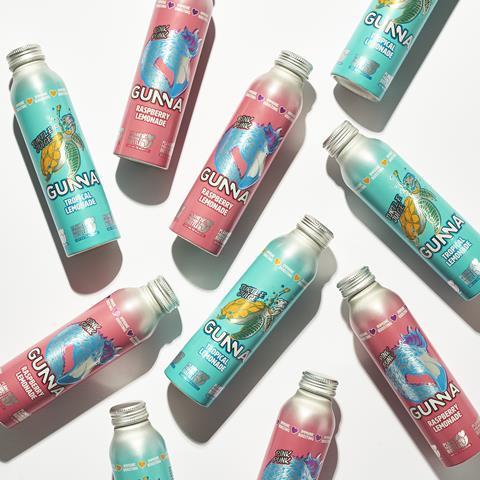
The soft drinks and water industry is currently the world’s second-biggest source of plastic pollution. It creates over 600 billion plastic bottles each year – a figure expected to triple in the next 30 years.
Enter The Sustainable Bottling Co, which was launched in early 2024 by Melvin Jay, the founder of anti-plastic campaigning soda brand Gunna Drinks. Based near Leicester, The Sustainable Bottling Co is Europe’s first production facility capable of bottling flavoured drinks into eco-friendly aluminium bottles.
As well as bottling Gunna’s own lemonades, the company will also offer white label aluminium bottling to the broader industry. “Maybe surprisingly, filling drinks into aluminium bottles requires highly specialised equipment, so the launch of our 8,000 sq ft facility required a £1m investment into new purpose-built production lines,” says Jay.
The company is already seeing “encouraging” rates of sale for its aluminium bottles – which offer all the eco-friendly credentials of an aluminium can but with the all-important sip-and-reseal convenience of a bottle. “We know many consumers want to make more sustainable purchases, but the lack of good alternative packaging holds them back,” Jay adds.
Aquapak Polymers
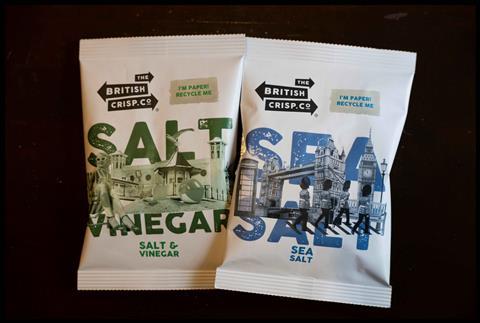
Aquapak’s Birmingham-based scientists spent 10 years developing Hydropol, an environmentally friendly polymer that provides a soluble, non-toxic and marine-safe alternative to traditional plastics. So far, it’s been used to package everything from chocolate and confectionery to household and personal care products.
But the most high-profile breakthrough came earlier this year, when Hydropol was used to create the UK’s first fully recyclable crisp bag at kerbside.
Launched by The British Snack Co, in partnership with Ukrainian packaging converter Evopak, the packs ditch the standard multi-layered plastic and metallised film combo that makes crisp packets so tough to recycle.
Instead, the crisps are kept fresh and crunchy thanks to the protection from moisture and oxygen provided by Hydropol.
Prevented Ocean Plastic
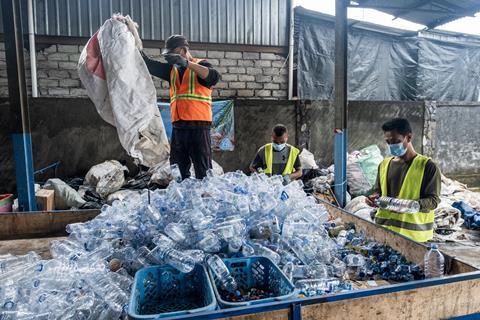
Prevented Ocean Plastic is on a mission to turn the tide on plastic pollution. Although not strictly speaking a packaging company, Prevented Ocean Plastic covers both a collection programme and a trademarked material that aims to provide packaging companies, retailers and consumers with better plastic choices.
Essentially, it incentivises the collection of discarded plastic from coastal areas at high risk of waste and then turns it into everything from bottles to fruit punnets.
The collection is undertaken by local plastic collectors on coastlines from Indonesia to Ecuador, helping tens of thousands of people to earn a living while also minimising ocean plastic. “Our responsible sourcing framework supports hardworking members of the informal waste sector and drives dignity and standards into a supply chain that has traditionally lacked both,” says Raffi Schieir, director of Prevented Ocean Plastic.
Following collection, the plastic is taken to local centres for payment, where it is washed, sanitised and processed into raw materials that become new products. Since its formation in 2019, Prevented Ocean Plastic has created almost 2,000 direct jobs and prevented more than 2.5 billion plastic bottles from entering the ocean.
The initiative has already attracted backing from major retailers including Sainsbury’s, Lidl and Waitrose.
Schieir says he’s proud that “all our partners know exactly where their recycled plastic comes from in a system where every bottle is counted and every person counts”.
Zerocircle
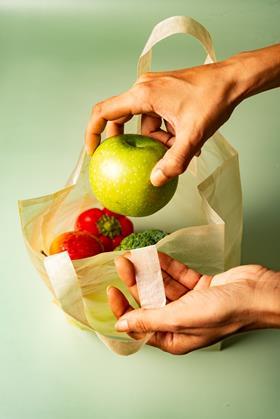
“Seaweed innovation has blossomed as a climate solution across industries in the past few years,” says Neha Jain, founder and MD of Zerocircle, which creates sustainable plastic and paper alternatives from the material.
Its seaweed-based portfolio spans thin films that can replace several single-use flexible plastic applications, greaseproof barrier coatings for use in food boxes, and wood-free seaweed paper that is safe for food.
Founded and based in India – Asia currently accounts for 97% of the world’s seaweed production – Zerocircle is currently collaborating with a range of brands in the UK and EU that are seeking sustainable alternatives.
Frugalpac
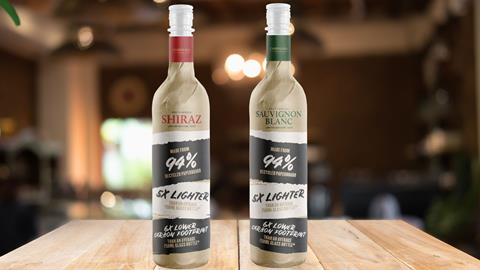
“The biggest carbon footprint in UK supermarkets is in the wine and spirits aisles,” says Malcolm Waugh, CEO of Frugalpac, the Ipswich-based packaging company that has come up with a solution.
“Offering our Frugal Bottle allows drinks producers to cut the carbon footprint of their bottles by 84%,” he says.
The bottle in question is produced from 94% recycled paperboard along with an easily separable food-grade pouch that is similar to the bags found in box wines. The company claims the Frugal Bottle is the world’s first and only commercially available paper bottle for wines and spirits.
Being five times lighter than a glass bottle, its production and disposal uses six times less carbon and energy than a standard bottle, it says.
“Our packaging offers an immediate solution to consumers and drinks producers who want to reduce their carbon footprint,” says Waugh.
There are 47 brands currently using the bottles, across over 130 SKUs, in 25 countries around the world. In the UK, Aldi was the first supermarket to use the Frugal Bottle for its own-label wines, while Sainsbury’s also lists The Greener Greenall’s Original London Dry Gin in them.
But Frugalpac’s mission doesn’t end here – its innovation centre also produces the machines that make the carbon-saving bottles.
By selling these Frugal Bottle Assembly Machines – which can each produce 2.5 million paper bottles a year – into local wine-producing regions, Frugalpac aims to help decarbonise the global drinks industry even further.
Sonoco
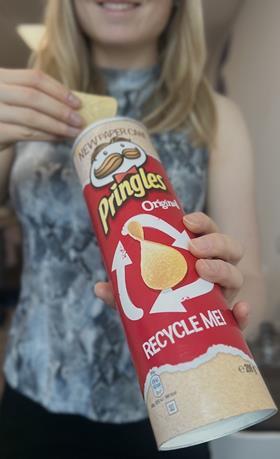
The Pringles tube presented a tough challenge for packaging experts. In fact, creating a recyclable version was thought to be nigh-on impossible due to the multiple layers involved.
But a solution was unveiled earlier this year by South Carolina-based packaging expert Sonoco.
Developed with Pringles owner Kellanova, the new tube’s 90% paper composition means it’s widely recyclable kerbside. It was initially rolled out in the UK at Tesco and One Stop stores, and has also made its way to Belgium and the Netherlands.
“The main obstacle was the transition of the tube’s bottom from metal to paper,” says Seàn Cairns, president, global rigid paper and closures at Sonoco Consumer Europe. “While it may seem like a simple change, the process involved complex chemistry and technical considerations.”
G Mondini
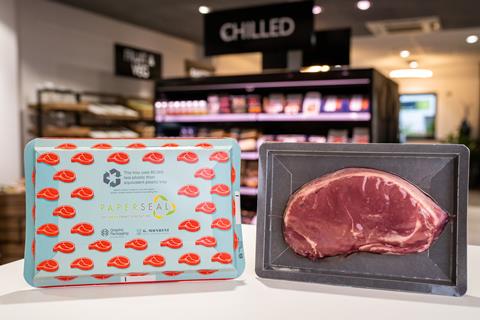
Shelf appeal and pack performance are key in the fresh meat aisle, but the traditional tray-and-film combo known as vacuum skin pack (VSP) poses some questions on sustainability.
Italian packaging company G Mondini has created an answer with its PaperSeal Skin. Developed in partnership with Graphic Packaging, the Paperseal Skin tray delivers a plastic saving of up to 90% compared with VSP, while maintaining its pack performance benefits, such as a potential 28-day shelf life.
It “allows us to help our customers dramatically reduce their plastic use while maintaining the highest pack quality and integrity,” says G Mondini UK MD Ross Layton.







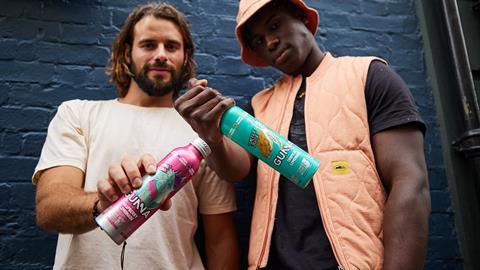
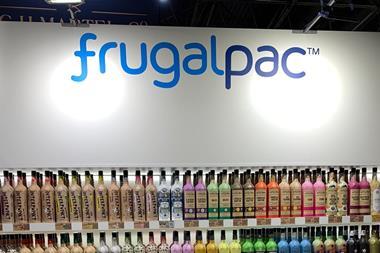




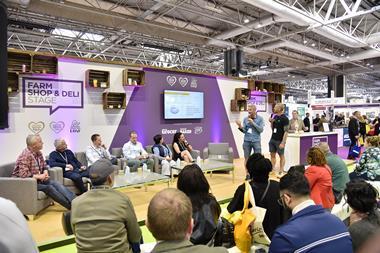
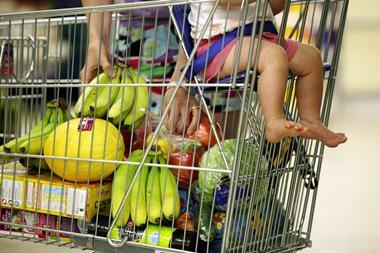
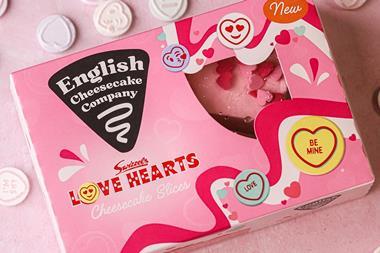




No comments yet